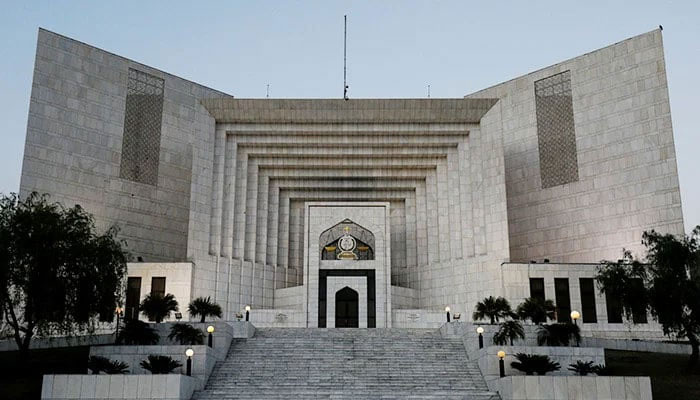SC has extensive powers to set aside any law: CJP
PM Shehbaz Sharif, Nawaz Sharif and Asif Ali Zardari were the beneficiaries of the amendments to NAB ordinance, NAB report read
ISLAMABAD: The Supreme Court was informed on Wednesday that Prime Minister Shehbaz Sharif, Nawaz Sharif and Asif Ali Zardari were the beneficiaries of the amendments made in 2022 to the National Accountability Ordinance (NAO) 1999.
A three-member bench of the apex court, headed by Chief Justice Umer Ata Bandial and comprising Justice Ijazul Ahsan and Justice Syed Mansoor Ali Shah, was informed of this fact during the hearing of a petition filed by former prime minister Imran Khan, challenging the amendments made by the incumbent coalition government to the NAO 1999. During the course of hearing, Justice Mansoor Ali Shah asked the special prosecutor NAB about the volume of cases decided after the NAB amendments and asked for submitting details pertaining to cases sent back to forums concerned.
In pursuance of the court order, the National Accountability Bureau (NAB) submitted its report to the court, containing list of politicians, businessmen and government officials who benefited from the amendments made to the NAB law either during the PTI reign or in the incumbent government.
As per the report, Shehbaz Sharif, Nawaz Sharif and Asif Ali Zardari were the beneficiaries of the amendments. Similarly, it was stated in the report that Anwar Majeed, a friend of Zardari, also benefited from the NAB amendments. Farzana Raja, Yousuf Raza Gillani, Speaker Punjab Assembly Sibtain Khan, former prime minister Shaukat Aziz, Zafar Gondal, Sadiq Imrani, Nawab Aslam Raisani, Lashakari Raisani, Asfandyar Kakar, Arbab Alamgir, Asma Arbab Alamgir and Sher Azam Wazir were also beneficiaries of the amendments.
The report also contains list of corruption references made by the NAB, which were returned in the PTI government. The court was informed that 50 NAB references were returned after the amendments made to the NAB law. The report stated that nine NAB references filed against former minister for water and power Raja Pervez Ashraf were returned in the PTI government’s tenure while two references filed against Yousuf Raza Gillani were also returned in the PTI government tenure. Similarly, the report stated that two NAB references filed against former finance minister Shaukat Tarin with allegations of misuse of power were returned in the PTI government.
It was submitted that NAB references filed against Javed Hussain, former member Gilgit-Baltistan Assembly, Mehtab Abbasi, the former governor Khyber Pakhtunkhwa (KP), were returned in the PTI government’s tenure, adding that a NAB reference filed against Gul Bahar Khan, former health minister, Gilgit-Baltistan, was returned in the same period. The references filed against Farzana Raja and Asif Ali Zardari were also returned in the PTI government.
Earlier, during the course of hearing, Justice Bandial observed that the parliament had granted extensive powers to judiciary to set aside any law.
The counsel for the federal government, Makhdom Ali Khan, while continuing his arguments, submitted that no law enacted by the parliament could be challenged in court on the allegation of mala fide.
Justice Mansoor said that apart from fundamental rights, whether the NAB amendments could be struck down if found in contradiction to other provisions of the Constitution. Justice Ahsen remarked that any new law, if found contrary, to the existing provisions of the Constitution could be struck down. Justice Mansoor questioned as to whether the Supreme Court could determine the malice of parliamentarians behind any legislation?
Makhdoom replied that the supreme court in various judgments had said it was quite easy to level an allegation of malice but quite difficult to establish it. He submitted that if the parliament changed the nature of punishment while amending a law, it was also applicable to the convict. Later, the court adjourned the hearing for today (Thursday).
-
 Belgium Watchdog Launches Antitrust Probe Into Google Ads Business
Belgium Watchdog Launches Antitrust Probe Into Google Ads Business -
 Andrew Ready To Fight Back: 'He's Very Vengeful'
Andrew Ready To Fight Back: 'He's Very Vengeful' -
 After Surpassing 100 Million YouTube Subscribers, BLACKPINK Returns With New Release
After Surpassing 100 Million YouTube Subscribers, BLACKPINK Returns With New Release -
 Rihanna Sends Fans Into Frenzy With BTS Footage Of Music Making: Watch
Rihanna Sends Fans Into Frenzy With BTS Footage Of Music Making: Watch -
 More Americans Say They Sympathise With Palestinians Than Israelis, Poll Finds
More Americans Say They Sympathise With Palestinians Than Israelis, Poll Finds -
 Princess Finally Releases Meghan Markle, Prince Harry's Photos
Princess Finally Releases Meghan Markle, Prince Harry's Photos -
 Victoria Beckham Makes Exciting Announcement Amid Ongoing Rift With Brooklyn Beckham
Victoria Beckham Makes Exciting Announcement Amid Ongoing Rift With Brooklyn Beckham -
 King Charles Receives Major Blow After Meghan Markle, Harry's Trip
King Charles Receives Major Blow After Meghan Markle, Harry's Trip -
 Kate Middleton Apologizes After Her Umbrella Bumps Child's Head
Kate Middleton Apologizes After Her Umbrella Bumps Child's Head -
 Retired US Fighter Pilot Arrested Over Alleged Training Of Chinese Military
Retired US Fighter Pilot Arrested Over Alleged Training Of Chinese Military -
 Why Sarah Ferguson's Next Move Matters?
Why Sarah Ferguson's Next Move Matters? -
 Kris Jenner's Plan For Kylie Jenner To 'seal The Deal' With Timothee Chalamet Unveiled
Kris Jenner's Plan For Kylie Jenner To 'seal The Deal' With Timothee Chalamet Unveiled -
 Kim Kardashian Changes Approach To Dating Amid Lewis Hamilton Romance
Kim Kardashian Changes Approach To Dating Amid Lewis Hamilton Romance -
 Andy Cohen Gets Emotional As He Addresses Mary Cosby's Devastating Personal Loss
Andy Cohen Gets Emotional As He Addresses Mary Cosby's Devastating Personal Loss -
 Andrew Feeling 'betrayed' By King Charles, Delivers Stark Warning
Andrew Feeling 'betrayed' By King Charles, Delivers Stark Warning -
 Andrew Mountbatten's Accuser Comes Up As Hillary Clinton Asked About Daughter's Wedding
Andrew Mountbatten's Accuser Comes Up As Hillary Clinton Asked About Daughter's Wedding




